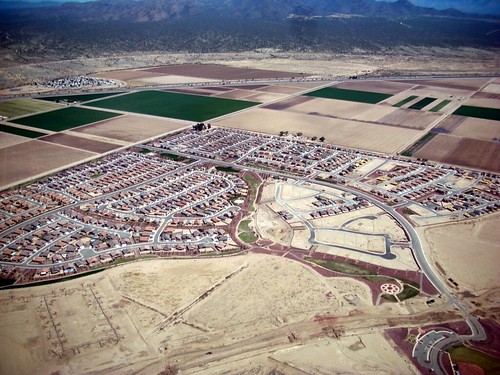It doesn't have to be low-density to be sprawl

Posted August 6, 2012 at 1:25PM
On my flight home from California last week, I took the photo above. It's not the greatest photo, but I captured the image to illustrate the edge of suburban sprawl in some place or other, I'm not sure where.
Reviewing it later, one of the things that struck me is that the development protruding onto the landscape in the photo is actually relatively high-density, as single-family residential development goes. Those are small lots, and my very wild guess is that we could be looking at 15-20 homes per acre, enough to pass the density prerequisite of LEED for Neighborhood Development and maybe even earn a density point or two.
But everything else about that development looks SO wrong - leapfrogging across opportunities for contiguous development, fragmenting the landscape, extending the footprint of the region, lacking connectivity, in an area that looks seriously short of water supplies. It's not really low-density, but it's definitely sprawl. I'm sure its transportation characteristics are horrible.
Likewise for the photo above, of development somewhere in the vicinity of Tucson.
Search for almost any definition of suburban sprawl and you will likely find a reference to low-density development. For a lot of people, the terms are synonymous: if it's sprawl, it's low-density and, if it's low-density, it's sprawl. Among many urban advocates, the corollary is that, if low density is bad, then high density is good, the higher the better.
But, for quite a while now, I've been thinking that it's much more complicated than that. Higher densities by themselves don't cure sprawl, and sometimes even create new problems that muct be dealt with. Density is important, but it isn't enough and must be approached with sensitivity. The image above is of a Houston suburb; those lots are tiny, especially in the upper portion of the photo. But it qualifies as sprawl in my book.
Finally, I can't resist posting another photo I took on the same flight. If there is such a thing as agricultural sprawl, this may be an example. Does that look like a great place to be drawing groundwater from the aquifer or diverting it from a waterway so you can grow irrigated crops? I don't pretend expertise when it comes to agriculture, but to me this looks like a remote, dry location intrinsically undersuited for farming.
Related posts:
- Guess what DOESN'T stay in Vegas: sprawl (March 9, 2012)
- How sprawl is like Bernie Madoff (June 24, 2011)
- The man who thinks Manhattan isn't dense enough (May 19, 2011)
- Striking images of disconnected streets and unwanted sprawl (October 1, 2010)
- Using urban density to support parks, and vice versa (March 9, 2010)
- Considering the role of density in smart growth (April 28, 2009)
Move your cursor over the images for credit information.



